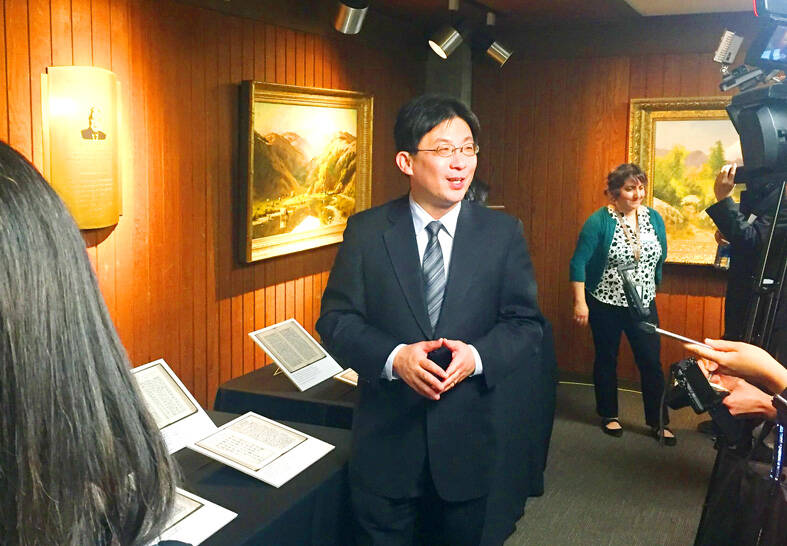A US court has awarded Academia Historica ownership of the diaries of former presidents Chiang Kai-shek (蔣介石) and Chiang Ching-kuo (蔣經國), ending a decade-long legal battle and setting up their return to Taiwan later this year.
The ruling on the documents, which are currently housed at Stanford University’s Hoover Institution, was made on Tuesday last week by the US District Court in San Jose, California, the San Francisco Standard reported on Tuesday.
The dispute dates back to 2005, when Chiang Ching-kuo’s daughter-in-law Chiang Fang Chih-yi (蔣方智怡) signed an agreement for the Hoover Institution to curate the diaries for 50 years.

Photo: CNA
After receiving conflicting claims of ownership to the diaries, Stanford University filed an interpleader action in the US in 2013 to determine who had legal rights to the documents.
Later that year, when several members of the Chiang family transferred ownership of the diaries to Academia Historica, Taiwan’s state archives, the institution was added to the university’s inquiry.
In 2015, the US court ruled that Academia Historica should first launch a legal inquiry into the diaries’ ownership in Taiwan, where most of the litigants are located.
Following a multiyear trial, the Taipei District Court in 2020 ruled that the diaries dating from the Chiangs’ time in office were the property of the state, while all other files belonged to the Chiang family.
That decision was upheld on appeal last year by the High Court and was recognized by the US court in its ruling last week.
While the rulings could have led to the documents being split up, several members of the Chiang family who had claimed the diaries agreed after the trials in Taiwan to donate them to the archives. Chiang Ching-kuo’s granddaughter Chiang Yo-mei (蔣友梅) was the last family member to reach an agreement in May.
Academia Historica President Chen Yi-shen (陳儀深) told the Central News Agency that the archives had recently sent two experts to take an inventory of the documents, which include the personal diaries of Chiang Kai-shek from 1917 to 1972 and Chiang Ching-kuo from 1937 to 1979, as well as copies of their speeches and diplomatic correspondence.
Once the inventory is completed, the collection will most likely be shipped to Taiwan before the end of the year, Chen said.
In terms of the collection’s content, Chen said he was planning to publish at the end of October an “especially valuable” portion of Chiang Kai-shek’s diary, covering his first term as president from 1948 to 1954.
While Chiang Ching-kuo’s diaries only run through the end of 1979, Chen said the portions from 1977 to 1979 — which include the period when the US switched diplomatic recognition to Beijing — are already available in Academia Historica’s online database.
Asked if the diaries would be displayed in public, Chen was noncommittal, saying his first priority was to make them available to academics, and, in the longer term, have them uploaded into the archives’ presidential database.

INVESTIGATION: The case is the latest instance of a DPP figure being implicated in an espionage network accused of allegedly leaking information to Chinese intelligence Democratic Progressive Party (DPP) member Ho Jen-chieh (何仁傑) was detained and held incommunicado yesterday on suspicion of spying for China during his tenure as assistant to then-minister of foreign affairs Joseph Wu (吳釗燮). The Taipei District Prosecutors’ Office said Ho was implicated during its investigation into alleged spying activities by former Presidential Office consultant Wu Shang-yu (吳尚雨). Prosecutors said there is reason to believe Ho breached the National Security Act (國家安全法) by leaking classified Ministry of Foreign Affairs information to Chinese intelligence. Following interrogation, prosecutors petitioned the Taipei District Court to detain Ho, citing concerns over potential collusion or tampering of evidence. The

Seventy percent of middle and elementary schools now conduct English classes entirely in English, the Ministry of Education said, as it encourages schools nationwide to adopt this practice Minister of Education (MOE) Cheng Ying-yao (鄭英耀) is scheduled to present a report on the government’s bilingual education policy to the Legislative Yuan’s Education and Culture Committee today. The report would outline strategies aimed at expanding access to education, reducing regional disparities and improving talent cultivation. Implementation of bilingual education policies has varied across local governments, occasionally drawing public criticism. For example, some schools have required teachers of non-English subjects to pass English proficiency

‘FORM OF PROTEST’: The German Institute Taipei said it was ‘shocked’ to see Nazi symbolism used in connection with political aims as it condemned the incident Sung Chien-liang (宋建樑), who led efforts to recall Democratic Progressive Party (DPP) Legislator Lee Kun-cheng (李坤城), was released on bail of NT$80,000 yesterday amid an outcry over a Nazi armband he wore to questioning the night before. Sung arrived at the New Taipei City District Prosecutors’ Office for questioning in a recall petition forgery case on Tuesday night wearing a red armband bearing a swastika, carrying a copy of Adolf Hitler’s Mein Kampf and giving a Nazi salute. Sung left the building at 1:15am without the armband and apparently covering the book with a coat. This is a serious international scandal and Chinese

NEGOTIATIONS: The US response to the countermeasures and plans Taiwan presented has been positive, including boosting procurement and investment, the president said Taiwan is included in the first group for trade negotiations with the US, President William Lai (賴清德) said yesterday, as he seeks to shield Taiwanese exporters from a 32 percent tariff. In Washington, US Trade Representative Jamieson Greer said in an interview on Fox News on Thursday that he would speak to his Taiwanese and Israeli counterparts yesterday about tariffs after holding a long discussion with the Vietnamese earlier. US President Donald Trump on Wednesday postponed punishing levies on multiple trade partners, including Taiwan, for three months after trillions of US dollars were wiped off global markets. He has maintained a 10 percent